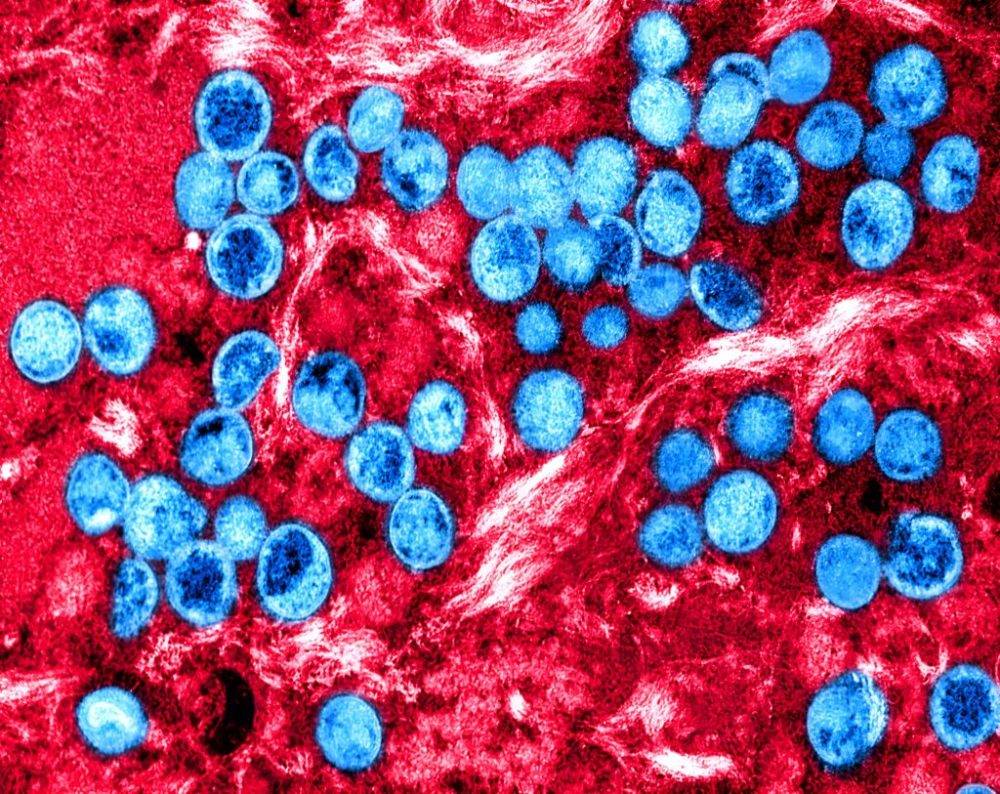Government says mpox is under control but cites Covid-19 ...
In a statement on Sunday, the department said the total number of positive cases recorded in the country stood at 24, including three deaths, 19 recoveries and two active cases undergoing home isolation. It said 12 cases had been reported in Gauteng, 11 in KwaZulu-Natal and one in the Western Cape. (Photo by: NIH-NIAID/IMAGE POINT FR/BSIP/Universal Images Group via Getty Images)

The department of health says the outbreak of mpox remains under control in South Africa but has warned the public to learn from the Covid-19 pandemic and not become “complacent” as the disease rages across the continent.
In a statement on Sunday, the department said the total number of positive cases recorded in the country stood at 24, including three deaths, 19 recoveries and two active cases undergoing home isolation. It said 12 cases had been reported in Gauteng, 11 in KwaZulu-Natal and one in the Western Cape.
Although there were no new cases in the country: “That does not mean people should become complacent because we have learned from Covid-19 pandemic that viruses are unpredictable as they mutate from time to time.
“The country remains on high alert in case of a surge in mpox cases and emergence of new contagious strains. Members of the public are urged to play their part and support the country’s response efforts to prevent the spread of mpox by maintaining non-pharmaceutical measures, including personal hygiene.”
Last week the World Health Organisation said the upsurge of mpox cases in the Democratic Republic of the Congo (DRC), and a growing number of other countries in Africa, constituted a public health emergency of international concern. More than 17 000 cases have been reported across the continent, mostly in the DRC.
In his capacity as the African Union Champion on Pandemic Prevention, Preparedness and Response, President Cyril Ramaphosa said he was deeply concerned by the rapid spread of mpox across multiple regions on the continent, with a significant rise in both cases and fatalities, “reflecting a concerning shift in the epidemiological pattern”.
“Since the start of 2024, a total of 17 541 cases (2 822 confirmed and 14 719 suspected) and 517 deaths due to mpox have been reported across 13 AU member states.
“This week, three additional countries notified cases under investigation for confirmation. That can bring the total to 16 countries. Alarmingly, the number of reported cases in 2024 has surged by 160% compared to the same period in 2023,” Ramaphosa said.
According to WHO, mpox is a viral illness caused by the monkeypox virus. Common symptoms are a skin rash, which can last for up to four weeks, accompanied by fever, headache, muscle aches, back pain, low energy and swollen lymph nodes.
The DRC has reported the more lethal of the two strains of the virus, with more than 14 000 confirmed cases, followed by Burundi, with more than 100 cases. The strain has also spread to the East African countries of Rwanda, which has four cases, Uganda with two and Kenya with one confirmed case.
Sweden announced that one person had contracted the more severe variant, which WHO said has been spreading mainly through sexual networks. According to Sweden’s health ministry the patient, who is in isolation, contracted the disease during a stay in Africa.
Pakistan’s Ministry of National Health Services has confirmed its first case. While health officials said they were still trying to determine the exact strain of the virus, it said the person had come from Saudi Arabia.
South Africa and Cote d’Ivoire are experiencing the spread of the variation which is reportedly less lethal. Cameroon is the only country reported to have both variants of mpox.
The WHO has been working with nations worldwide to accelerate vaccine access and containment measures to curb the spread of the virus, director general Tedros Adhanom Ghebreyesus said.
South African has been able to secure a few batches of Tecovirimat, also known as TPOXX, donated by WHO, according to the health department, but spokesperson Foster Mohale added last week: “Prevention is better than cure, so people must not focus on the treatment but must focus on the prevention by exercising caution and practising good hygiene.”
The WHO’s declaration last week followed that by the Africa Centres for Disease Control, which warned that the current statistics on mpox on the continent were likely to reflect only the tip of the iceberg.











































